Verander van taal :
Glijlagers - Installatie en toleranties
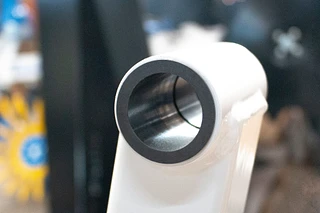
Wat is de tolerantie voor de boring van de behuizing?
iglidur glijlagers zijn perslagers die met overmaat in een H7-tolerantie huisboring worden geperst. Hun binnendiameter wordt pas ingesteld na het persen in de H7-behuizingboring. De perspassing kan tot 2% van de binnendiameter bedragen. Dit garandeert een veilige perspassing van de bussen. Axiale en radiale verplaatsingen in de behuizing worden zo betrouwbaar vermeden.
Het gat in de behuizing moet voor alle lagers worden gemaakt volgens tolerantie H7 en zo glad, gelijkmatig en afgeschuind mogelijk zijn. De montage wordt uitgevoerd met een vlakpers. Het gebruik van centreer- of kalibratiepennen kan het lager beschadigen en tot een grotere speling leiden.

Installatie van igutex vezelcomposiet lagers
igutex glijlagers kunnen worden geïnstalleerd met een vlakke pers, een vlakke plaat of een persstift. De paspen mag niet scherp zijn. Een ondersnijding bij de flensovergang is aan te raden om beschadiging te voorkomen. Installatie door middel van hameren, bijvoorbeeld met een hamer, wordt afgeraden omdat dit het vezelcomposiet glijlager kan beschadigen.
Fact sheet: All information on the installation of igutex fibre composite plain bearings
Diverse perspassingsmethoden
Hydraulisch of mechanisch
De meest gebruikte methode is de mechanische perspassing van het glijlager met een handpers. Er wordt een vlakke persstempel gebruikt om het glijlager in de boring van de behuizing te persen. Er mag geen centreer- of kalibratiepen worden gebruikt, omdat dit kan leiden tot scheuren langs de lasnaad en een grotere lagerspeling.
Zonder pers
Als er geen pers beschikbaar is of als de omstandigheden het gebruik van een pers niet toelaten, kan het glijlager voorzichtig worden gemonteerd met een rubberen hamer. Een stuk hout tussen het glijlager en het hout kan helpen om het lager te beschermen tegen beschadiging.
Geautomatiseerde assemblage
Bij (gedeeltelijk) geautomatiseerde assemblage is de juiste aanvoer en positionering van de componenten bijzonder belangrijk. Het kan zinvol zijn om de geometrie van de componenten te optimaliseren voor het proces. Met kunststof glijlagers zijn er vrijwel geen beperkingen aan het ontwerp. Geometrieën met conische diameters, groeven of anti-rotatievoorzieningen kunnen kosteneffectief worden gerealiseerd.
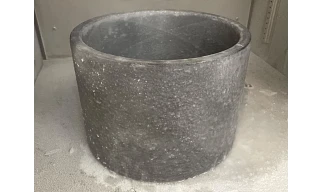
igutex glijlager na krimpen
Krimpen
Het koelen van de glijlagers kan helpen om glijlagers gemakkelijker te persen. De bussen worden gekoeld met vloeibare stikstof, krimpen in elkaar en passen daardoor gemakkelijker. Voordat de lagers worden gekrompen, moeten ze grondig worden gereinigd en gecontroleerd op beschadigingen. Als ze weer opgewarmd zijn, zet het materiaal weer uit en zit het lager stevig in de boring van de behuizing.
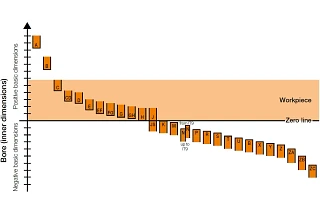
Aanbevolen toleranties
De inbouwhoogte en toleranties van het iglidur glijlager zijn afhankelijk van het materiaal en de wanddikte. Vochtopname en thermische uitzetting zijn bepalend voor het materiaal. Glijlagers met een lage vochtopname kunnen worden geïnstalleerd met een kleine lagerspeling. Voor de wanddikte geldt: hoe dikker het lager, hoe groter de lagerspeling moet zijn.
Dit resulteert in verschillende tolerantieklassen voor iglidur glijlagers. Met deze toleranties kunnen iglidur-glijlagers volgens de montageaanbevelingen in het betreffende toelaatbare temperatuurbereik en bij een luchtvochtigheid tot 70% worden gebruikt. Bij een hogere luchtvochtigheid of als de lagers onder water worden gebruikt, verdienen materialen met een lage vochtopname de voorkeur.
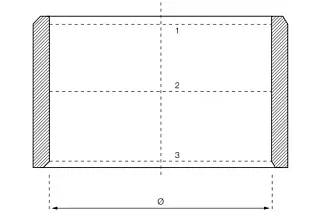
De positie van de meetniveaus (1, 2, 3 = meetlijnen)
De lagerzitting controleren
iglidur glijlagers zijn perslagers voor behuizingen met een H7-eenheidsboring. Deze perspassing van het lager zorgt enerzijds voor de borging van het lager in de behuizing en anderzijds voor de vorming van de binnendiameter van het glijlager. Het lager wordt getest, geïnstalleerd in het gat met de kleinste afmeting, zowel met een meetklok als met een pluggenmeter.
- In het gat gedrukt, moet de goede kant van de stopmaat het lager soepel passeren.
- Met een schuifmaat moet ervoor worden gezorgd dat de binnendiameter van het lager op de meetvlakken gemiddeld binnen de opgegeven tolerantie ligt (zie schema hiernaast).
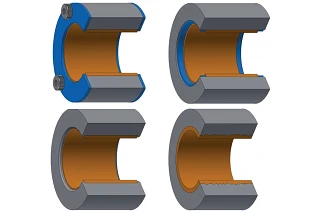
Vastzetten spie
Glijlagers "migreren" uit de boring van de behuizing als de perspassing verloren gaat. Glijlagers worden vaak met een perspassing bevestigd in een behuizing met een iets nauwere tolerantie. Onder mechanische spanning zit het lager stevig in het gat. Als deze mechanische spanning afneemt door hoge temperaturen of permanente overschrijding van de toelaatbare belasting, neemt de perspassing ook af.
Het kan natuurlijk ook gebeuren dat de fabricagetoleranties van de boring van de behuizing zo onnauwkeurig zijn dat het gat niet voldoende ondermaats is. Ook in dit geval kan het lager niet voldoende spanning opbouwen om een perspassing te creëren. Het resultaat is extreme slijtage van het glijlager. De oplossing voor dit probleem is een opspanslot van het glijlager. Welke mogelijkheden er zijn om de glijlagers axiaal te borgen, vind je in onze factsheet onder het onderwerp "vastzittende spie".
Glijlagers inlijmen
Glijlagers worden meestal in de boring van de behuizing geperst of geklemd. Dit zorgt ervoor dat ze stevig in het gat zitten en niet onbedoeld ronddraaien. Maar wat als dit niet mogelijk is door fabricagetoleranties? Of als het glijlager wel moet draaien?
Ook al behoort het niet tot het standaardrepertoire van veel glijlagers, kunststoflagers kunnen ook glijden op de buitendiameter. Daarom worden kunststof lagers gebruikt. Het lager wordt op een bout geplaatst en moet dan - samen met de bout - ergens in draaien of ergens op rollen. Lijmen lijkt een goede oplossing. Maar er zijn waarschijnlijk net zoveel lijmen als lagermaterialen. Welke is de juiste?
Richtlijn voor machines
iglidur glijlagers worden gebruiksklaar geleverd. Het uitgebreide productassortiment maakt het in de meeste gevallen mogelijk om standaardafmetingen te gebruiken. Als een nabewerking van het glijlager toch noodzakelijk is, geeft de tabel hiernaast de richtlijnen voor de bewerking. Indien mogelijk moet echter nabewerking van de glijvlakken worden vermeden. Dit heeft meestal een hogere slijtage tot gevolg. Een uitzondering is bijvoorbeeld iglidur M250, dat zeer geschikt is voor nabewerking. Bij de andere iglidur glijlagers kunnen de nadelen van het bewerken van de glijvlakken worden gecompenseerd door gebruik te maken van montagesmering.
| Proces | Draaien | Boren | Frezen |
|---|---|---|---|
| Materiaal gereedschap | Roestvast staal | Roestvast staal | Roestvast staal |
| Voedingssnelheid [mm] | 0.1 ... 0.5 | 0.1 ... 0.5 | tot 0,5 |
| Spellingshoek | 5 ... 15 | 10 ... 12 | |
| Klemhoek | 0 ... 10 | 3 ... 5 | |
| Snijsnelheid [m/min] | 200 ... 500 | 50 ... 100 | tot 1000 |
Contacteer ons
Vragen? Neem dan contact op met:

Customer Service
Customer Service:
Telefonisch: Maandag tot vrijdag 8.00 - 17.00
LiveChat: Maandag tot vrijdag 8.00 - 17.00
Whatsapp: Maandag tot vrijdag 8.00 - 17.00
Plan een afspraak
Plan een afspraak met een expert

